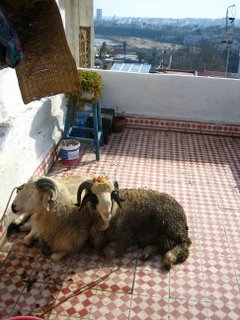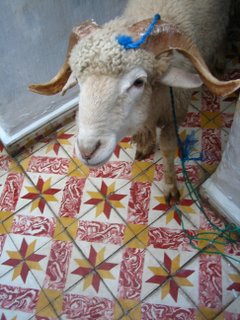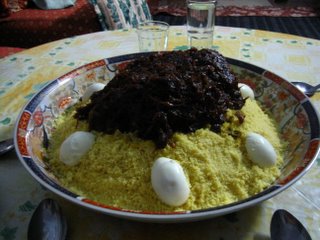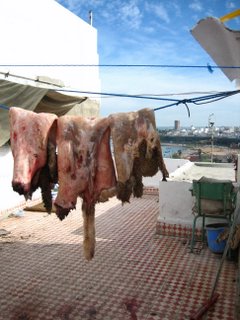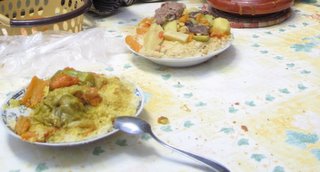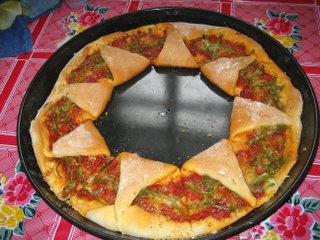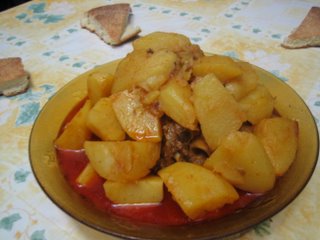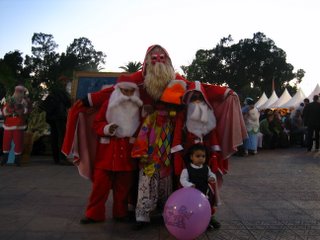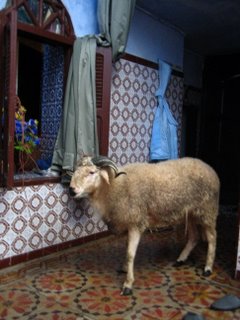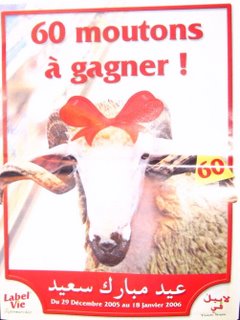Rock the casbahSo, on Wednesday afternoon, I had been invited for tea at my host family's house in the
Oudaya, the casbah where I had lived the first time that I was here in Rabat. As I exited the casbah and crossed the street towards the medina, I noticed that there were several
2M television vans outside of the lower casbah door. So I asked a police/security-type guy what was going on. He told me that the station was having a party. I asked him if it was an open party, and he told me that I would be welcome to attend.
I went back into the casbah and was allowed by the security guards at the entrance into the building traditionally called the
medersa with no problem. (A
madrasa, in classical Arabic, and
medersa in colloquial Moroccan, is a school. The building in the casbah was a palace, and not a school.) I went into the main courtyard of the building, and was seated. A woman came up to me and asked me how I had gotten in; I told her that a guard had invited me (which was true, really.) She had me fill up a form (name, address, national identification number) and assure her that I would be able to stay until the end.
It turns out that 2M was recording a series of musical soirées featuring artists from all over Morocco. There were five different groups that played; the last one featured awesome hip-shaking from the high Atlas. I didn't catch the names of any of the performers, but people told me that they ranged from really famous popular singers to well-respected folk groups.
At some point during the performance, the wind picked up (the performance was in the palace courtyard, which had been covered for, I believe, the occasion--one of the Fulbrighters lives right across from the palace witha view over the courtyard, and it wasn't covered the other day.) It had been raining earlier in the day and, apparently, a large amount of rain had gathered. A ball of rain fell on the performance area, soaking half a dozen Berbers. About thirty seconds later, a second ball of rain fell from the sky, this time hitting the other half-dozen members of the troupe. This second ball also hit a power adapter, and the lights went out.
Long story short, the event lasted well past two in the morning. The musical performances themselves were long finished, but there was a portion during which the host of the program interviewed the leader of each group. I was so tired! I had also been extremely hungry, but there was a food break with
brewat,
pastila,
quiche, pizza, and pastries. During the food break, the woman who was in charge of the audience (and who, cleverly, had sequestered my jacket, among others, so that it both looked good on television
and audience members couldn't sneak out early) invited me to come back for the next day's taping and performances, and told me that I could bring some friends if I wanted. Start time was 6pm, she said.
On Thursday, I went back with a couple of fellow Fulbrighters in tow. Several changes from the previous day existed: first, the interviews with the group leaders were conducted first. That way, the audience would want to stay around for the good stuff! Second, the tarps covering the courtyard were no longer three individual sections but, instead, one very large covering.
The performances ranged from extremely loud and too long for my taste to
awesome. Both nights had at least one performance with lip syncing rather than live singing (this was by the musicians that could be described more as pop/rock than as folk; in the interview portion, one of the folk perfomers seemed to have no idea how to even hold a microphone.) One of the performers, during his set, was so excited to lead the audience in hand-clapping (and saying the Moroccan equivalent of yeah) that he forgot that he was supposed to be "singing" and so they had to start over again. (On the first night, there were three takes of the audience clapping! We didn't even know how to clap correctly for television!)
Moustapha Bourgogne was one of the
pop stars on Thursday; one of his songs included the word "internet" on a pretty regular basis and, if my Moroccan Arabic is getting up to speed, had a chorus that roughly translates to, "everything keeps changing, but you are still like honey." One of the folklore groups that performed was called the
Abidat Erma Khouribga; at the reception at the end, one of the guys who had been sitting next to my table introduced us to their leader whose costume for the performance had a completely different color scheme than the rest of the group: he wore white slippers with black socks, they yellow with white socks. His
djellaba was dark blue instead of light yellow, and his shoulder bag was white. (On their web site, which I strongly recommend you take a look at for a few minutes, the color schemes are different yet again!)
And today, the performance from Thursday was on television!


